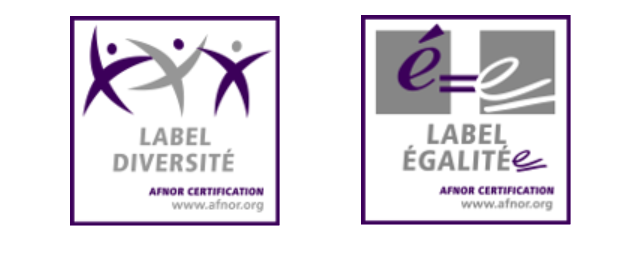Link
DIVERSITY AND INCLUSION
FDJ promotes diversity within an inclusive Group

OUR COMMITMENTS
Promote and develop diversity within FDJ
FDJ Group is inclusive and representative of society.
Social equality has driven us since the beginning, and we actively seek out innovative ways to promote diversity and inclusion, battling all forms of discrimination. This ambitious approach, which we have been pursuing for many years, is one of the pillars of our CSR policy.
As proof of its commitment, FDJ holds two certifications attributed by French standardisation body AFNOR: Diversity Certification (since 2013) and Workplace Male and Female Equality Certification (since 2017).

-
Socio-economic diversity
We aim to reach a community of diverse employees who represent our current and future customers by being inclusive of all socio-economic, cultural, and educational backgrounds. The Group is committed to increasing representation among workers from underprivileged urban areas, through working with local schools and encouraging work experience.
-
Gender equality
Our tangible recruitment, training, career path, salary, and work organisation measures actively enable women to be better represented in the workplace.
All’In, FDJ Group’s gender diversity network, was created in 2017 and contributes to the development of leadership and women’s place within the Group, notably through raising awareness, leading to richer workplace experiences and tackling stereotypes.
In 2019, we got involved with the intercompany “Stop au Sexisme Ordinaire en Entreprise” (Stop Everyday Sexism at Work) initiative. In 2022, members of the Group Management Committee showed their commitment to gender equality by signing the #JamaisSansElles (#NotWithoutHer) chart.
-
Disability
Our policies around inclusion of employees with disabilities have been in place for a number of years.
When we employ someone with a disability, we offer support where needed, and provide any required equipment.
At the end of 2019, the Group signed the “Manifeste pour l’inclusion des personnes handicapées dans la vie économique” (“Manifesto for the inclusion of people with disabilities in economic life”), to bolster support among business leaders to increase the employment of people with disabilities.
-
Inter-generation
We encourage collaboration and the transmission of experience and knowledge between different generations. We support workers from all generations, notably through our policy to recruit students on work placements as a stepping stone on their path to the world of work.
Since 2017, our approach to senior employees has seen us implement an action plan for workers 45 and over who actively want to prolong their professional lives.
Also, workers reaching retirement age receive support to help them prepare for their retirement when the time comes.
-
Sexual orientation and gender identity
We are committed to providing an inclusive workplace where all employees are treated the same, whatever their sexual orientation and gender identity. We stand against LGBTphobia. In 2023, the Group crystallised its commitment to the cause by signing the LGBT+ Charter brought forward by the charity L’Autre Cercle. An internal network dedicated to the subject, called All’Proud, has been created by committed employees.
WHISTLEBLOWING
FDJ Group’s ethical whistleblowing policy
FDJ Group provides its employees and external stakeholders with a process and guaranteed protection for whistleblowers in cases of bullying or discrimination. The policy enables those concerned to alert us to situations that are against the law or our ethical principles.
GENDER EQUALITY
Increasing the number of women in management and striving for fair pay
The Group is committed to workplace equality between men and women, especially in terms of managerial diversity:
- Women made up 40% of Group Management Committee members in 2022, versus 38% in 2021.
- Women make up 35% of the highest-paid employees, and FDJ SA now has the same proportion of women in managerial roles as in the company overall (43%).
Furthermore, following the 2023 gender equality index:
- FDJ SA received a gender equality index of 100/100
- The subsidiary FDP received 93/100
- The subsidiary FGS France received 88/100
The following table shows how the index was calculated for each of the companies within FDJ Group.
| Indicator | FDJ | FDP | FGS France |
| Gender pay gap | 40 | 38 | 38 |
| Individual pay rises | 20 | 20 | 35 |
| Promotions | 15 | 15 | |
| Maternity leave | 15 | 15 | 15 |
| 10 highest salaries | 10 | 5 | 0 |
| TOTAL | 100 | 93 | 88 |
